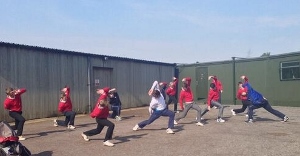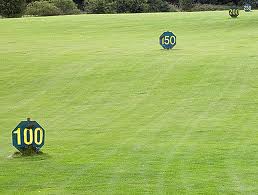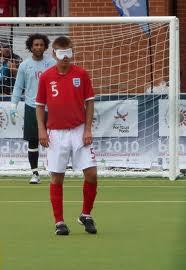Main Menu
Latest Blog Entry
User login
How to practice: should we teach this first?
“Rather than teach what to practice, I should start with how to practice”
 This was the lesson I learnt from working with golf coach John Jacobs on a recent training day.
This was the lesson I learnt from working with golf coach John Jacobs on a recent training day.
John had set up a simple pitching task for the 10 golfers: they had to try and pitch 10 balls into some different spaces he had marked out with cones.
He clearly said 3 times “work out the distance to the target” before they started pitching.
10 minutes later, despite each owning £300+ rangefinders (I know, me too!), only 2 of the golfers had managed to measure 1 of the targets! What had they been doing?
They had done the usual thing of just getting out their pitching wedges and having a go. The results reflected that: the 10 best boy golfers in the South West were unable to hit a target 30 metres away.
My fellow coach Matt and me are no golfers, but we were amazed that the boys (15-16 years old) were unable, or unwilling, to even measure the distance. That is definitely a “controllable” that they could “control”.
(The uncontrollables include things like: weather, quality of opposition, bounce of the ball, selection for squad, competition draw.)
However, this is typical of this age group, whatever the sport.
Controllables that we should control
It is easy for old and supposedly wise heads like myself and John, to be astounded at this. But, I need to put myself back 29 years and see where I was then. Here are a few things I tell the young athletes that they should be able to control.
- Fitness: that is within your control. Yes, you will need guidance on the correct exercises, structure and progressions. No, I am unable to get out of bed and do the run for you.
- Warm Up:as mentioned previously, this is important before practice and competition. It is part of a routine. By focusing on this, you are less likely to be distracted by external events and your opponents. Get this sorted, and stick to it.
- Nutrition: we are in control of what we put in our mouths. Having a blood sugar crash on the 13th hole because you have failed to prepare a snack is down to you. One of the golfers had missed breakfast that morning: that is simply careless and is giving the opposition an advantage.
- Kit: having the right kit for the job at hand. It is alright having a £300 range finder (!) but if it is at home, how can you use it? Waterproofs, correct shoes, spare laces, safety pins for vest numbers, and so on. Think ahead and pack it the night before you go away.
There are more (and please leave suggestions below) but if you get these 4 things right, then you will be better prepared than 95% of your opposition.
This may seem simple, but I see it every time, every practice, every squad. At the SW Fencing Hub, we have been looking at “coping with adversity“. I told Coach Tristan Parris that there was no need for us to creat adverse situations: the fencers were brilliant at creating their own adversity by neglecting the 4 points above!
The good news is that those of the golfers who have taken the advice, such as Tom Trowbridge, have seen immense benefits already.
How to practice
 Once you have got the above things right, then it is time to sort out your own practice. I have asked the golfers to sort their warm ups out, and to do 5 minutes of exercises a day.
Once you have got the above things right, then it is time to sort out your own practice. I have asked the golfers to sort their warm ups out, and to do 5 minutes of exercises a day.
This is to start the exercise habit and get into routines (how to practice). But, most have failed to do this.
Why?
- Is it because I have failed to emphasise the benefits for golf? They all like to hear “golf specific” before every exercise.
- Is it because I have demonstrated too quickly? One of the girls’ parents said the exercises were impossible (my 4 year old son is able to do them all) everything is tricky at first, those who practice pick this up in a week.
- Or is it because the actual organisation of time and structure is alien to these young people? If your golf coach, personal trainer or Mum do everything for you, then you never learn how to do things on your own.
John gets all the golfers to carry a notebook and pencil, so they can write down any thoughts on their round or practice. I am going to try and get the golfers to write down what their plan is for the next week. This means minute by minute, rather than “go for a run twice“.
Then I will ask them to write down the aim of every session, and 1 key thing they need to focus on. They can then write down their warm up, and how the first 10 minutes of practice is going to start.
“Hit 50 balls with each club” is the wrong answer! As is “go to the gym and follow the golf specific app exercise plan on my phone“.
I have incorrectly assumed that young people can organise their own time to a certain extent. The practice session with John showed that this is a generic trait, rather than an exercise related trait.
It took 30 minutes of the training session before the golfers really took control of their practice. Things improved from there. But, that is 30 minutes of wasted time every practice.
If young athletes learn “how to practice” first, then the “what to practice” will become more effective.
Further reading
- Educating junior athletes: getting them to think like pros.
- How to change habits: the power of goal setting
- For coaches: how to use the micro practice
Client Testimonials
 Robin Williams GB Footballer Paralympian
Robin Williams GB Footballer Paralympian
I have been training with James for over four years now and firmly believe he has played a key role in my transformation as an athlete and therefore as a footballer. It’s fair to say I was in poor condition in various aspects when we first met, however, James’ ability to focus on the most important things and eliminate the baggage from training has enabled me to develop rapidly, having missed selection for the 2009 European Championships I am now a regular in the starting lineup.
More

